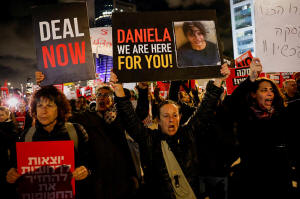Israeli hostage families gain clout as political landscape shifts
 Send a link to a friend
Send a link to a friend
 [February 05, 2024]
By Emily Rose and Estelle Shirbon [February 05, 2024]
By Emily Rose and Estelle Shirbon
JERUSALEM/LONDON (Reuters) - When pollsters asked a representative
sample of the Israeli public in January to name anyone they would like
to see entering politics, relatives of hostages held by Hamas in Gaza
were among the names that cropped up most often.
The previously unreported survey, seen by Reuters, shows the families'
appeal to Israelis who would like to see political change, at a time
when Prime Minister Benjamin Netanyahu's popularity is at rock bottom.
This is part of a wider transformation of Israel's political landscape
precipitated by the Oct. 7 Hamas attack, and likely to accelerate when
the most intense phase of the Gaza war ends and a reckoning for the
security failures of that day begins.
"The hostage protests are a pivotal point for other types of protests
against the government to emerge," said Nimrod Nir, political
psychologist at the Truman Research Institute of the Hebrew University
of Jerusalem, which conducted the survey.
One of the names mentioned by respondents was Gil Dickmann, a cousin of
hostage Carmel Gat and an active figure in the Hostages Families Forum
campaign group.
Another was Jonathan Shamriz, whose brother Alon was one of three
hostages mistakenly shot dead by Israeli forces in Gaza on Dec. 15, and
who has become an outspoken government critic.
"I will do what I need to in order to fix this country. If that means
going into politics, then I'll have to see," he told Reuters.

Some respondents did not mention names but wrote variants of "hostage
families", reflecting the impact of the Forum itself and its "Bring them
home now" campaign.
Hamas militants killed 1,200 people in southern Israel and abducted 253
in their Oct. 7 incursion, according to Israeli tallies. Israel has
responded with an all-out military assault on the Hamas-ruled Gaza Strip
that has killed more than 27,000 Palestinians there, according to local
health officials.
LEFT-RIGHT DIVIDE
The Forum and most individual relatives of hostages have been trying to
avoid partisan politics or confrontation with the right-wing coalition
government while the lives of their loved ones hang in the balance.
"Our struggle right now is not a political struggle," said Elad Or,
whose brother Dror is in Hamas captivity. Dror's wife Yonat was killed.
The couple's two teenage children were held hostage until Nov. 25 when
they were freed during a brief truce.
Mirroring the restraint of the families, who inspire huge public
empathy, Netanyahu has mostly avoided overtly criticising them, although
frustrations have mounted on both sides.
Protests by relatives outside his house have irked Netanyahu. He lashed
out during a Jan. 27 news conference that such actions "only strengthen
the demands of Hamas".
During the week-long truce in late November, Hamas freed more than 100
Israeli and foreign hostages in exchange for Israel releasing about 240
Palestinian prisoners.
Since then, the issue of what price Israel should pay to get the more
than 100 remaining hostages back, and how to balance that goal against
its other stated war objective, to destroy Hamas, has become
increasingly polarizing.
[to top of second column]
|

Demonstrators hold up signs during a protest held by families
of hostages and supporters to call for the release of hostages
kidnapped in the deadly Oct. 7 attack by Palestinian Islamist group
Hamas, in Tel Aviv, Israel, February 1, 2024. REUTERS/Susana
Vera/File Photo

Negotiations between Israel and Hamas on a ceasefire and hostage
deal, mediated by Qatar and Egypt and backed by the United States,
are ongoing but the outcome is uncertain.
Netanyahu, who faces rifts within his fractious coalition over terms
for a deal, said on Sunday Israel was not ready to accept any price
for the hostages.
Polls by the Truman Institute and the Israel Democracy Institute (IDI)
show a sharp left-right split on the issue.
On the left, support for a deal with Hamas involving concessions
such as a ceasefire or prisoner release in exchange for the hostages
is much higher, while on the right opposition to such a deal and
support for continuing the war are stronger.
Political scientist Tamar Hermann of the IDI said solidarity with
the hostage families was blending with broader anti-government
sentiment, partly rooted in a huge pre-war protest movement against
Netanyahu's plan to overhaul the judiciary.
KIBBUTZ FACTOR
A large proportion of the Gaza captives come from kibbutzim,
communities that have deep historical links with the political left.
New or existing left-wing parties could be a natural fit for any
hostage relatives who did decide to go into politics.
Asked whether his party wanted to recruit any of them, Tomer Reznik,
secretary-general of left-wing Meretz, said it was reorganizing
itself for the next election and part of this would be finding new
candidates "relevant to the current situation".
Conversely, the hostage families are seen as opponents by some on
the right, and especially on the ultra-nationalist far right, which
has sway over Netanyahu because it is part of his fragile coalition.
Two far-right ministers implacably opposed to a deal with Hamas
could bring down his government at any moment.
Some of Netanyahu's hard-right supporters in politics and media
portray the hostage families as leftists abusing public sympathy to
further their anti-government agenda, said political scientist
Gideon Rahat of the Hebrew University.
One tactic, he said, was to amplify the voices of a tiny number of
far-right hostage relatives who oppose any deal with Hamas, such as
Eliyahu Libman, a settler from Kiryat Arba in the Israeli-occupied
West Bank, whose son Elyakim is held hostage.
Libman has argued that Israel must destroy Hamas, no matter the
cost, so that no Israeli is harmed by it in future.
"My son is the most important thing in the world to me but the state
of Israel is also the most important thing in the world to me," he
said on Channel 13 TV.
(Writing by Estelle Shirbon; editing by Mark Heinrich)
[© 2024 Thomson Reuters. All rights reserved.]This material
may not be published, broadcast, rewritten or redistributed.
Thompson Reuters is solely responsible for this content.
 |